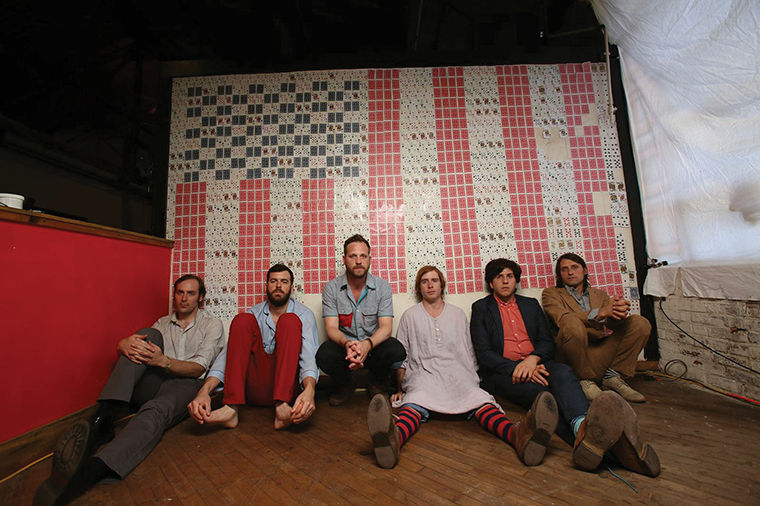Philadelphia rockers Dr. Dog lead way in lo-fi revolution
Philly psych rock band Dr. Dog is leading the way in the lo-fi music resurgence. With new labels such as Burger Records, Dr. Dog has inspired a generation of new rockers.
April 6, 2015
Philadelphia native band Dr. Dog has made a name for itself during the last 15 years as one of indie rock’s most celebrated groups.
Consisting of guitarist and vocalist Scott McMicken, bassist and vocalist Toby Leaman, guitarist Frank McElroy, keyboardist Zach Miller, drummer Eric Slick and multi-instrumentalist Dimitri Manos, the band has been at the forefront of the resurgence of lo-fi music.
After My Morning Jacket singer Jim James received a copy of Dr. Dog’s debut Toothbrush in 2003, the band was asked to serve as My Morning Jacket’s opening act on its 2004 tour and has steadily raised its profile ever since. With its last studio album B-Room (2013) and first live record, Live At a Flamingo Hotel (2015), Dr. Dog returns to Chicago April 10 at Thalia Hall and April 11–12 at the House of Blues to bring its Philly-based lo-fi psych music to the Windy City.
The Chronicle spoke with McMicken about touring, Live At a Flamingo Hotel and the lo-fi revival.
THE CHRONICLE: How has Philadelphia influenced the band?
SCOTT MCMICKEN: It’s been a very supportive place to live as a band because it has enabled us to give as much time as we needed, looking back, in order to evolve in the way that we’ve evolved. Especially early on, Philly was the kind of city where you could pretty much live dirt poor and feel pretty satisfied and therefore use all your time to do the things you wanted and do the things you love to do, which for us is making music. The city itself has certainly enabled us to do what we have now done, for better or worse. It’s always kind of pushed us and kept us humble in our own endeavors of music making.
CC: You are playing several large venues for your current tour. What has it been like since the band got its start playing the small club scene?
When you’re in a small room and everyone’s right up there on you and your sweat might just be dripping right off your face onto them, it’s easy to feel like there’s a palpable energy between you and the audience because you’re literally thrust into each other. But the bigger the rooms get, the further away you become—literally and figuratively. It becomes more about a big picture and wanting to create an energy that’s larger to fill that space. To do that is a very different endeavor than doing it in a small room. Over the years as we’ve played bigger and bigger rooms, we’ve learned how to walk the line between transferring the totality of the band to the back wall of the room, but also have—for our own sanity—the immediacy and spontaneity and madness of what’s right in front of you and inside of yourself.
CC: The band recorded Live At a Flamingo Hotel throughout 20 separate shows rather than one single concert. Why did you decide to do this?
Mostly we did that because we weren’t confident in our abilities to pull off one show where we’re like, “This one show is definitively great from start to finish.” That’s why we titled it Live At a Flamingo Hotel. We were never thinking that we were trying to capture or falsify the idea that it was one night on Earth. We wanted to capture things over a long period of time because that’s how we look at things. It’s this nice balance between being very present and giving everything you have to give, but also looking at it in the long view and seeing where it was and what it is now and where it might go. Not everything in life affords you that relationship where the necessity of you being present every single day and what you have to do as a band all exists under an umbrella of an evolving thing.
CC: With cassette-minded Burger Records and other lo-fi bands following the model Dr. Dog has used for years, do you see a resurgence in lo-fi music?
When we put our first record out, which was over 10 years ago, it did feel like we were little fish in a big pond. All our heroes were way older than we were. I’ve noticed that change now, and I think it has a lot to do with the ebb and flow of our culture. Styles change and oftentimes that’s a reactionary thing. Pop culture currently feels very removed from an average person’s life in terms of the process that’s necessary to create what defines a popular culture. As a reaction to that, I think people say, “I can do this myself.” I think people are now looking for a much more tangible outlet, which is turning into music. People are making [music] in their bedrooms with broken, out-of-tune guitars. Even if you don’t have a million bucks or can’t make a record that sounds like Katy Perry, you can still say so much. You can be yourself and capture that in one million different ways now and a million more different ways than anyone in our past ever had the outlet for. Now there’s a rekindled enthusiasm for a simpler mode of expression. The reality is as much as the world changes, the bare essence of what music is and why it matters to human beings on Earth is never going to change. The face of [music] will always change as our culture changes, but the core values of it won’t change.
Dr. Dog will play two shows on April 11–12 at the Chicago House of Blues, 329 N. Dearborn St., with opening act mewithoutyou. Tickets start at $39.05.








